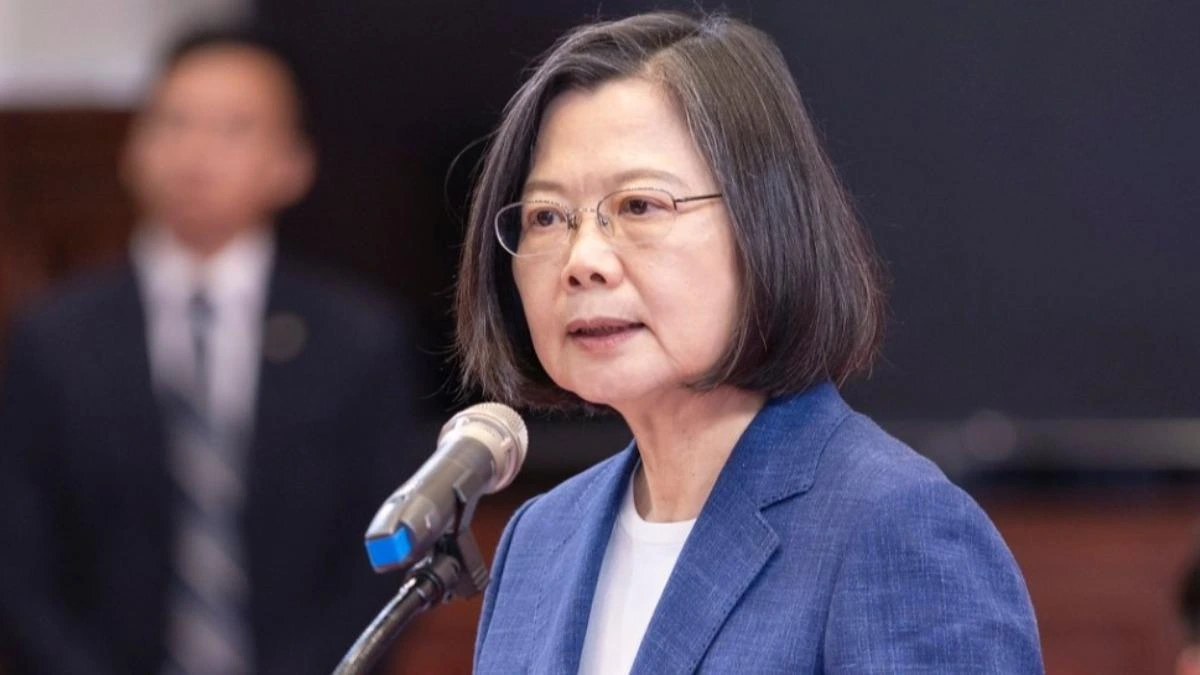BERLIN — Taiwan’s world leading chip industry has become both an economic engine and a strategic shield, former President Tsai Ing-wen told an audience at the Berlin Freedom Conference on Monday.
“Our high tech sector, particularly in semiconductors, has become an indispensable part of the global economy,” Tsai said. “In an age where AI also defines power, Taiwan’s chip industry anchors global prosperity.”
Tsai, who stepped down earlier this year after completing two terms, said the island’s technological strength reinforces its defence and societal resilience in the face of growing threats from Beijing. She stressed that Taiwan remains committed to international cooperation and values its security partnerships.
Taiwan, officially known as the Republic of China, is home to the world’s largest semiconductor manufacturers, including Taiwan Semiconductor Manufacturing Co. (TSMC), which supplies chips to global tech giants such as Apple, NVIDIA, and Qualcomm.
China, which claims Taiwan as its own territory, has increased military and political pressure on the island in recent years. Beijing opposes any form of official contact between Taiwanese leaders and foreign governments, viewing it as interference in its internal affairs.
Despite lacking formal diplomatic recognition from most nations, Taiwan has expanded its global engagement through trade, technology, and democratic values. Its chip industry has become a vital component of international supply chains and, as analysts note, a potential deterrent to aggression.
“Semiconductors are Taiwan’s ‘silicon shield,’” said Dr. Emily Richter, a senior fellow at the German Council on Foreign Relations. “As long as the world depends on Taiwan’s advanced chips, major powers have an incentive to maintain peace in the Taiwan Strait.”
Experts say Tsai’s remarks in Berlin reflect a broader diplomatic effort by Taipei to position itself as both a technological leader and a responsible global actor.
“By emphasizing its role in the semiconductor supply chain, Taiwan is effectively reminding the world that its security is tied to global stability,” said Professor Michael Hsu, an international relations scholar at National Chengchi University in Taipei.
Hsu added that Taiwan’s outreach to Europe has intensified since 2021, when several European delegations defied Beijing’s objections and visited Taipei.
The visits by lawmakers from countries including Lithuania, France, and the Czech Republic signaled growing European interest in Taiwan’s democratic model and technology sector.
Tsai’s message in Berlin echoed those diplomatic gains. We are willing to bear our share of the burden and do not take our partners’ support for granted she said. European officials attending the event described Tsai’s appearance as symbolically important.
“Her remarks underscored how deeply intertwined global security, democracy, and technology have become,” said German parliamentarian Anna Vogel, who participated in a panel discussion following Tsai’s speech.
Taiwan produces more than 60 percent of the world’s semiconductors and about 90 percent of the most advanced chips used in smartphones, data centers, and artificial intelligence systems, according to the Semiconductor Industry Association.
The island’s chip exports reached a record $180 billion in 2024, accounting for nearly 40 percent of its total exports. Meanwhile, global demand for chips surged 12 percent year over year, driven by AI development and the electric vehicle industry.
By comparison, South Korea ranks second in chip production, followed by the United States, Japan, and China. However, none match Taiwan’s technological sophistication at the sub 5 nanometer level the most advanced chips used in cutting edge computing and military applications.
The fact that Taiwan holds such a dominant position gives it both leverage and vulnerability, said Jens Weber, a supply chain analyst at the Berlin Institute for Strategic Technology. Any disruption in Taiwan due to conflict or natural disaster would have immediate global consequences.
For many in Taiwan, the semiconductor industry is more than just an economic lifeline it’s a source of national pride.
“Working at TSMC feels like being part of something bigger than a company,” said Grace Lin, a process engineer in Hsinchu Science Park. “We know our work supports not just Taiwan, but the entire world’s technology infrastructure.”
Local business owners also see the industry as vital to Taiwan’s stability. “When foreign delegations visit, they always talk about chips,” said Eric Huang, a café owner near a chip fabrication plant in southern Taiwan. “It makes us feel like Taiwan finally has something that can’t be ignored.”
In Berlin, members of Taiwan’s expatriate community attended Tsai’s speech to show support. “Hearing her speak about Taiwan’s role in global peace gives us hope,” said Jennifer Wu, a Taiwanese doctoral student at Humboldt University. “It reminds us that technology and democracy can coexist as strengths.”
Analysts expect Taiwan’s next administration to continue emphasizing semiconductor diplomacy using technology partnerships as a form of soft power.
The government has already signed research and investment agreements with the European Union and the United States aimed at diversifying chip supply chains.
However, challenges remain. China’s growing self sufficiency drive and massive investments in domestic chip production threaten to reshape the industry over the next decade. Meanwhile, geopolitical uncertainty in the Taiwan Strait continues to weigh on investor confidence.
“Taiwan’s strategic importance is both a shield and a target,” said Richter. “Maintaining that balance will require careful diplomacy and continued innovation.”
As the global race for semiconductor dominance intensifies, Taiwan’s chip industry stands at the heart of both economic progress and geopolitical tension.
In Berlin, Tsai Ing-wen’s message was clear: Taiwan’s technological strength not only fuels the world’s digital future but also fortifies its own resilience. “Our contributions to the global economy,” she said, “are inseparable from our commitment to peace.”
